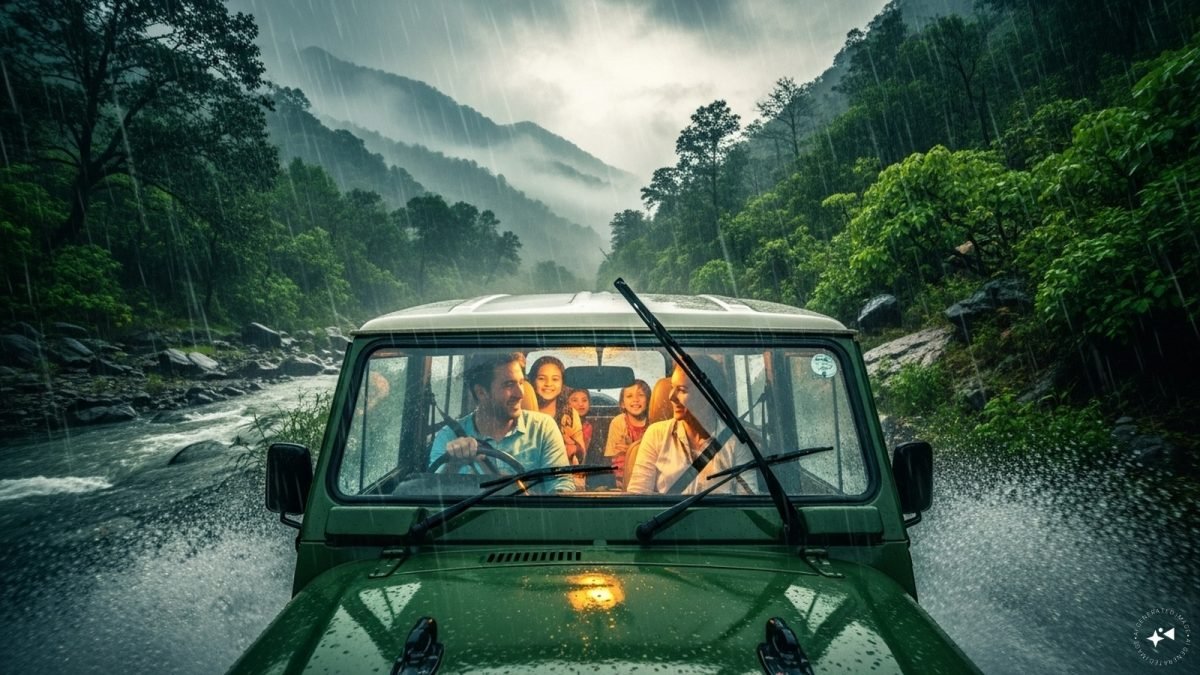Tips & Advices
Essential Monsoon Travel Safety Tips For Families To Stay Secure | Travel News

Last Updated:
Monsoon holidays can be fun if you’re ready. Stay safe, pack smart, and enjoy the rain with your family by following these tips when you hit the road this season.
Drive carefully and check vehicle readiness for monsoon conditions. (AI Generated Image)
Monsoon travel can be both beautiful and tricky. With lush green landscapes and cooler temperatures, it is the perfect season for a peaceful escape. But the rain also brings challenges like slippery roads, delays, and health concerns.
For families travelling with children or seniors, being extra cautious is important. With the right planning and smart packing, you can enjoy your monsoon trip while staying safe and dry.
Here are some essential monsoon travel tips for families.
Check The Weather Before You Travel: Always check the weather forecast before leaving. Heavy rains can lead to roadblocks, landslides, or delayed flights. Use trusted apps or websites to track updates. If there is a red alert at your destination, it is best to postpone the trip. For longer trips, keep checking weather updates every day so you can plan your sightseeing or driving accordingly.
Pack Rain-Friendly Essentials: Pack smart. Carry raincoats, umbrellas, waterproof bags, and quick-drying clothes for everyone in the family. Use zip-lock bags to keep phones, documents, and chargers dry. It is also a good idea to carry extra towels, a foldable rain shelter, and waterproof shoes. If you are travelling with kids, keep an extra set of clothes handy at all times in your day bag.
Health And Hygiene Matter: Monsoon can increase the risk of infections and stomach issues. Always drink bottled or filtered water and avoid eating street food that has been exposed to rain. Pack basic medicines, hand sanitiser, mosquito repellent, and wet wipes. If you have children or elderly travellers, keep their prescriptions and emergency medication with you at all times. Also, avoid walking in floodwater to reduce the risk of infections.
Drive Carefully: If you are planning a road trip, make sure your vehicle is ready for monsoon conditions. Check the tires, brakes, headlights, and wipers before you hit the road. Drive slowly, especially on wet or hilly roads. Avoid areas known for landslides or heavy flooding. If visibility is poor, it is safer to pull over and wait. Keep a flashlight, first-aid kit, and jumper cables in your car.
Choose Safe Accommodations: Book hotels that are located in safe, non-flood-prone areas. Read online reviews to ensure the hotel has good drainage and offers basic services even during power cuts. Some good hotels also provide umbrellas and rain gear for guests, which can be a bonus. If you are visiting hilly places like Himachal or Uttarakhand, avoid hotels built on steep slopes or unstable land.
Be Ready For Delays: Rain can delay flights, trains, and buses. Always have buffer time in your travel plans. Keep kids entertained with books, games, or downloaded movies in case you get stuck waiting. Carry enough snacks and water while travelling, especially if you are going to a remote area. Having a flexible itinerary helps reduce stress when plans change last minute.
Be Careful Around Water Bodies: Monsoon makes rivers, lakes, and waterfalls more dangerous due to strong currents. Avoid going too close to the edge, especially with children. Follow safety signs and avoid swimming unless it is in a safe, supervised area. It is best to admire nature from a distance during this season.
Stay Connected And Informed: Share your itinerary with a friend or family member. Save emergency contacts like the local police, hospital, and your hotel’s front desk. Carry a power bank to keep your phone charged. Stay updated with local news in case of roadblocks or weather alerts.
view comments
- Location :
Delhi, India, India
- First Published:
Tips & Advices
Travel alert: Landmines, theft, violence concerns at these 2 Southeast Asian countries
Federal authorities are warning Americans that traveling to two Southeast Asian countries can be dangerous and they should be extra cautious if visiting. They also advise against traveling to the countries’ border altogether.
The U.S. Department of State advisory level for Thailand and Cambodia were increased Friday to a Level 2, “exercise increased caution.”
The travel advisories were raised due to unrest in Thailand and concerns for crime and landmines in Cambodia, according to the advisories.
The U.S. government also issued a Level 4 “do not travel” advisory, advising against traveling within about 30 miles of the Thai and Cambodian border due to fighting between the countries’ military forces that started in May.
“There are reports of fighting, including rocket and artillery fire, between Cambodian and Thai forces along the border. Armed conflict has led to reports of civilian casualties,” the advisors read. “There is a collateral risk of violence, and U.S. citizens are advised to avoid all but essential travel to within 50km of these border areas until further notice. The U.S. government has limited ability to provide emergency services to U.S. citizens in these provinces due to the ongoing risk of armed conflict.”
The caution regarding travel to Thailand is “due to civil unrest associated with ongoing insurgent activities in the Yala, Pattani, and Narathiwat provinces,” that advisory said.
There is occasional violence between Thai security services and armed insurgents in those three southernmost provinces, the advisory explained, and 17 districts in that region are under a state of emergency due to the violence. Visitors risk getting caught up in the fighting and U.S. officials can’t guarantee they’d be able to help, the advisory warned.
The issue in Cambodia is different. That country’s capital city, Phnom Penh, is dealing with street crime, with many travelers losing their phone and bags to thieves, that advisory said. Sexual assault and murder are also concerns.
Landmines and unexploded ordnances are the concern in the provinces of Battambang, Banteay Meanchey, Pursat, Siem Reap, Pailin, and Kampong Thom, the advisory said, particularly in forested areas and dry rice paddies.
If you decide to travel to Cambodia or Thailand, the U.S. Department of State advises:
- “Do not physically resist any robbery attempt.
- Have evacuation plans that do not rely on U.S. government assistance.
- Enroll in the Smart Traveler Enrollment Program (STEP) to get important updates and alerts from the U.S. embassy or consulate. Enrolling helps the U.S. embassy or consulate contact you or your emergency contact in an emergency.
- Review the Country Security Report for Cambodia and Thailand.
- Prepare a contingency plan for emergency situations. Review the Traveler’s Checklist.
- Visit the CDC page for the latest Travel Health Information related to your travel.
- The government highly recommends you buy insurance before you travel. Check with your travel insurance provider about evacuation assistance, medical insurance, and trip cancellation coverage.”
If you purchase a product or register for an account through a link on our site, we may receive compensation. By using this site, you consent to our User Agreement and agree that your clicks, interactions, and personal information may be collected, recorded, and/or stored by us and social media and other third-party partners in accordance with our Privacy Policy.
Tips & Advices
Allianz Life says ‘majority’ of customers’ personal data stolen in cyberattack

U.S. insurance giant Allianz Life has confirmed to TechCrunch that hackers stole the personal information of the “majority” of its customers, financial professionals, and employees during a mid-July data breach.
When reached by TechCrunch, Allianz Life spokesperson Brett Weinberg confirmed the breach.
“On July 16, 2025, a malicious threat actor gained access to a third-party, cloud-based CRM system used by Allianz Life,” referring to a customer relationship management (CRM) database containing information on its customers. “The threat actor was able to obtain personally identifiable data related to the majority of Allianz Life’s customers, financial professionals, and select Allianz Life employees, using a social engineering technique,” the spokesperson said.
The company disclosed the data breach on Saturday in a legally required filing with Maine’s attorney general, but did not immediately provide a number of how many Allianz Life customers are affected. According to the spokesperson, Allianz Life has 1.4 million customers. Its parent company, Allianz, has more than 125 million customers worldwide.
Allianz Life said it notified the FBI, and added it had “no evidence” that any other systems on its network were compromised.
The insurance giant would not say if it had received any communication from the hackers, such as a ransom note. The company also would not attribute the breach to a hacking group.
Allianz Life is the latest company in the past month to have been hacked during a wave of data breaches targeting the wider insurance industry, including Aflac, a major provider of supplementary health insurance. Security researchers at Google said in June that they were “aware of multiple intrusions” across the insurance sector attributed to Scattered Spider, a collective of hackers and techniques that rely on social engineering techniques, such as deceptively calling and tricking helpdesks into granting them access to a company’s network.
Prior to targeting insurance companies, the Scattered Spider hackers were seen targeting the U.K. retail industry, as well as the aviation and transportation sectors, and are historically known for hacks targeting Silicon Valley technology giants.
Per the Maine filing, Allianz plans to begin notifying affected individuals around August 1.
Do you know more about the Allianz Life cyberattack? Are you an affected customer or employee? Securely contact this reporter via encrypted message at zackwhittaker.1337 on Signal.
Tips & Advices
Venus Williams and her health insurance: 4 things to know : Shots

Venus Williams returns a shot against Magdalena Frech on day 4 of the Mubadala Citi DC Open. Williams, 45, said she’s been on COBRA health insurance.
Scott Taetsch/Getty Images
hide caption
toggle caption
Scott Taetsch/Getty Images
What drove Venus Williams to the court at the Mubadala Citi DC Open this week after a year-long break from competition?
“I had to come back for the insurance,” she quipped in an on-court interview after winning her first-round match on Tuesday. “I was like, ‘I got to get my benefits on!’ Started training.”
The crowd at the stadium in D.C. laughed knowingly. “You guys know what it’s like!” she said.
Venus Williams made the remarks about health insurance after winning her first round match on Tuesday.
YouTube
Even if you’re not a seven-time grand slam champion who just became the oldest player to win a pro women’s singles match in decades, you probably know the job-health insurance juggle that Williams was talking about.
Here are four ways U.S. health insurance can be challenging for Williams and many other Americans.
1. Her job is a little off and on.
In the U.S., most working-age people get their health insurance through work. Their employer gives them a few plan options and then pays a healthy chunk of the premium cost, with the rest deducted from employees’ paychecks.
When someone leaves a regular job maybe to start a business or take a break, there goes that health insurance deal. That’s essentially what happened to Williams — she took a break from competition and lost access to her regular benefits.
The health insurance Venus Williams got through the Women’s Tennis Association was a “best-in-class global medical, dental and vision insurance plan,” WTA wrote in a statement to NPR. In order to be eligible, players have to have a certain ranking and play a certain number of events in the previous year, according to the statement, and coverage lasts for the full calendar year.
“They informed me earlier this year I’m on COBRA,” Williams explained on the court Tuesday. COBRA is a law that allows you to keep your job-based insurance plan after your job ends, but you have to pay for the whole premium yourself.
“With COBRA, you may have a very good plan, but your health care costs are going to go up,” explains Miranda Yaver, health policy professor at the University of Pittsburgh. It’s notoriously expensive, often $500 per month or more. COBRA to cover a whole family’s insurance premium can easily rival a mortgage payment.
Venus Williams is a multi-millionaire, so the premium cost might not matter to her in the same way it does to the average person, especially if it allows her to keep that “best-in-class” plan she’s used to.
2. She has health care needs.
“Let me tell you, I’m always at the doctor, so I need this insurance,” Williams said in her courtside interview.
Williams recently explained she had surgery for uterine fibroids that had gone undertreated for years, she said. She also was diagnosed with an auto-immune condition called Sjogren’s syndrome in 2011.
She’s also an elite athlete. “Someone in her position might need physical therapy, sports, medicine, specialized care, and to be able to get that anywhere in the world,” says Cynthia Cox, a vice president at the health research organization KFF.
Plus, Williams is now 45 years old. Health insurance costs generally increase with age, as do health problems.
All of that could make finding a health plan that works for her more complicated than for most people.
3. She has way more options than she used to.
Before the Affordable Care Act, Venus Williams would have really been in a tough spot.
Professional athletes were included on a list of “Ineligible Occupations” — jobs that health insurance companies deemed too risky to provide coverage for — along with loggers, miners and taxi cab drivers.
Also back then, “even a wealthy person might have had preexisting conditions that could have made them uninsurable no matter how much money they were willing to pay for their premium,” Cox says.
That contributed to “job lock” — where people were stuck in their jobs no matter what because they needed the health insurance.
Now, if Williams really didn’t want to compete anymore and ran out of her 18-months of COBRA coverage, she could go to Healthcare.gov and buy an Affordable Care Act plan.
4. Only in the U.S., jobs and health insurance are deeply linked.
There’s no escaping the fact that in America, health insurance is connected to employment. “The dominant insurance model in the United States is employer-sponsored insurance,” Yaver says. (The story of how that came to be is related to the post-World War II economy when health insurance was a “fringe benefit,” to attract employees in a tight labor market.) Yaver adds that for workers who get insurance from their jobs, it’s often “a good deal.”
Since Congress passed the One Big Beautiful Bill Act, the public insurance plan for low-income people, Medicaid, will soon be tied to work, too. Beneficiaries will have to periodically prove they’re working a certain number of hours per month to be able to keep their health benefits. That requirement will affect mostly middle-aged, low-income women, according to a recent analysis.
For Venus Williams, the off-and-on nature of her job that comes with a high risk of injuries makes employer-based health insurance especially hard. In a way, the tennis hall-of-famer is dealing with a very special version of “job lock.”
Her fans can celebrate, though. Even if it’s for the health insurance, they get to see her on the court again; she’s playing a tournament next month in Cincinnati.
-

 Brand Stories6 days ago
Brand Stories6 days agoBloom Hotels: A Modern Vision of Hospitality Redefining Travel
-

 Brand Stories24 hours ago
Brand Stories24 hours agoCheQin.ai sets a new standard for hotel booking with its AI capabilities: empowering travellers to bargain, choose the best, and book with clarity.
-

 Destinations & Things To Do7 days ago
Destinations & Things To Do7 days agoUntouched Destinations: Stunning Hidden Gems You Must Visit
-

 AI in Travel7 days ago
AI in Travel7 days agoAI Travel Revolution: Must-Have Guide to the Best Experience
-

 Brand Stories3 weeks ago
Brand Stories3 weeks agoVoice AI Startup ElevenLabs Plans to Add Hubs Around the World
-

 Brand Stories2 weeks ago
Brand Stories2 weeks agoHow Elon Musk’s rogue Grok chatbot became a cautionary AI tale
-

 Destinations & Things To Do20 hours ago
Destinations & Things To Do20 hours agoThis Hidden Beach in India Glows at Night-But Only in One Secret Season
-

 Asia Travel Pulse3 weeks ago
Asia Travel Pulse3 weeks agoLooking For Adventure In Asia? Here Are 7 Epic Destinations You Need To Experience At Least Once – Zee News
-

 AI in Travel3 weeks ago
AI in Travel3 weeks ago‘Will AI take my job?’ A trip to a Beijing fortune-telling bar to see what lies ahead | China
-

 Brand Stories3 weeks ago
Brand Stories3 weeks agoChatGPT — the last of the great romantics











You must be logged in to post a comment Login